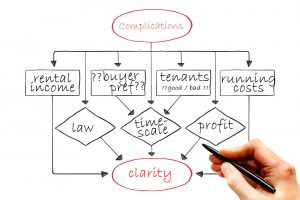
As documented in Different Ways to Sell Buy-To-Let Property, there are A LOT of decisions to be made and a lot of laws to be considered when landlords decide they want or need to sell their rental property and a lot of it depends on factors that are usually unknown at the start of the process – such as, whether the buyer you haven’t met yet is looking for a private residence or a rental property and whether they would prefer a sale with sitting tenants or vacant possession.
If landlords selling tenanted property choose to leave tenants in situ during the sale it could cause problems showing the property but if they vacate the property too soon, it could cost them thousands in lost rent.
The best option, of course, is to leave sitting tenants in situ as long as possible but not so long that it causes problems. Timing, speed and legal advice are all crucial to getting the best results for landlords selling tenanted property.
National Residential specialise in selling tenanted (& sub-tenanted) property, often with additional complications like short leaseholds or absentee freeholders.

In A Nutshell
Selling ex-rental property (with or without tenants) can be very different to selling residential property… from the types of property to the types of buyer …let alone the other issues like uncooperative tenants, tenant damage and multiple tenancies with different end dates – all tied up with financial pressures of maintaining empty property often with plenty of cost but no rental income.
We make sure our auctions are open to everyone from investors who are always looking for appropriate properties to the owner occupiers who are normally prepared to pay more and make sure you get the best price possible from your ex-rental property in the shortest time.
Once a sale is agreed, most estate agents hand responsibility over to solicitors to proceed in their own time and back to the sellers to solve any problems putting the sale at risk. Often, they won’t even take on a sale if they think the completion will be more risky or complicated than routine sales in anticipation the sale will collapse.
We are different – we specialise in selling ALL property including property with foreseeable problems because we are confident from experience that we can solve any issue quickly and efficiently using our expertise, our resource teams and our cash fund.
Add to that, the nonrefundable deposit buyers pay to secure the sale, our expertise as skilled negotiators, our unwavering determination and commitment (partly due to our no sale, no fee policy) and we believe that we are the BEST and possibly the ONLY team with all the right skills, systems and resources to get the best price possible and see potentially complicated and time consuming ex rental sales through from start to finish as quickly and stress free as possible for our sellers.
Use our callback form or phone us on 0800 612 8659 (24/7, 365) to leave your contact details. we will phone you back ASAP in office hours to discuss your needs and suggest a plan. There is no obligation to proceed and no sale, no fee so you have nothing to lose except a TON of hassle, stress and expense selling ex-rental property with tenants and/or other problems any other way.
The most common problems we experience selling tenanted properties are:
- Tenants refusing to allow viewings
- Tenants subletting property (normally without the landlords permission)
- Broken down relations/stalemate between the tenant and landlord
- Misguided, legal advice
- Additional complications
Any illegal response to a breach of contract can be pursued by the the tenant through the courts (sometime without incurring any cost or risk to themselves) and if the court awards in the tenant’s favour, a landlord may face heavy fines and/or damages because two wrongs never make a right in a court of law.
Entry into a tenants’s home without their permission or a landlord turning up to the property without the agreed notice could be considered harassment.
Legal Action
Legal advice given to landlords by solicitors may be factually correct but can also be counter productive to a fast, happy, successful resolution.
If a landlord wants to sell a tenanted property, they should of course know their legal standing and use it to their advantage HOWEVER pursuing a breach of contract through the courts can be a complicated, expensive and lengthy process that can result in significant delays to a sale process and potentially, a loss of income that may not be recoverable regardless of a court ruling if the tenant’s financial circumstances does not permit it.
It is an option that National Residential are happy and equipped to use but we consider it a last resort, not our first course of action because pursuing a legal ruling through the courts may be a slower and more expensive option than negotiation and compromise while it may not be in a solicitor’s own interest to recommend a similar strategy.
Selling Tenanted Property With A Tenant’s Cooperation
Whenever it is prudent to do so, National Residential will always try to get a tenant to cooperate and participate in viewings through incentives and ‘soft’ bargaining options – such as the assurance of a good reference, guaranteed return of their deposit ahead of schedule and/or ignoring minor misdemeanours that are not illegal – e.g. keeping an unauthorised pet.
While we always act in the best interest of the landlord, we use our lack of emotional involvement to position ourselves as an intermediate – focusing on the best possible outcome for all parties rather than negative emotion like frustration and/or anger or purely the legal standing of either party.
We make sure tenants understand that any incentive we offer is provided by National Residential, is conditional and we have a team of housing law experts available to pursue legal action if required.
Leave It All To Us
Our most popular sales option to sell tenanted property is our fixed price option. We agree a price the seller is happy to accept for a quick, hassle free sale of tenanted property. Once we have received a guaranteed offer for the property we can release funds into the sellers’ accounts while we try to make a profit from the sale by getting a better price. Sellers do not have to wait for completion to receive funds.
Sellers are not liable for any fees, expenses or commission in our fixed price sales option – simply agree a price, wait for a sale then leave any hassle or worry about sitting tenants to us to sort out – none of it is your concern after that point.

 The Online National Residential Agency: Best Price Possible & Quickest Sale - guaranteed
The Online National Residential Agency: Best Price Possible & Quickest Sale - guaranteed



